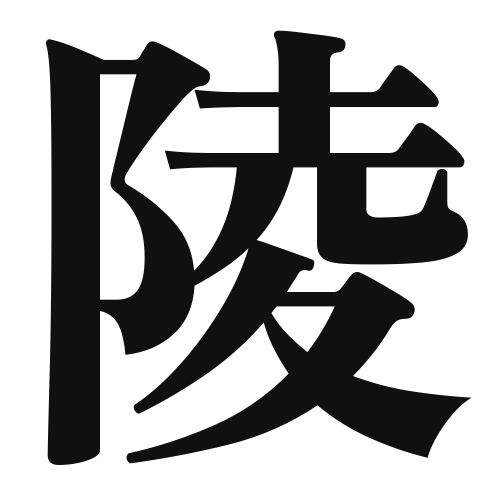1. Overview of Meaning
The kanji “陵” (pronounced “ryō” in Japanese) generally means “tomb” or “mausoleum.” It often refers to the burial sites of emperors or important figures in history.
2. Formation and Radical
Formation of the Kanji: The kanji “陵” is a compound character that combines elements to convey its meaning. It consists of the radical for “mountain” (山) and the character “陵,” which suggests a raised or elevated area, symbolizing a burial mound.
Radical: The radical of “陵” is 山 (mountain), which is often associated with elevation and nature.
3. Examples of Usage
Common Words and Phrases:
- 陵墓 (りょうぼ, ryōbo) – tomb
- 陵園 (りょうえん, ryōen) – mausoleum garden
Example Sentences in Daily Conversation:
- 彼は有名な天皇の陵を訪れました。 (かれはゆうめいなてんのうのりょうをおとずれました。) – He visited the tomb of a famous emperor.
- この陵園はとても美しいです。 (このりょうえんはとてもびじゅつです。) – This mausoleum garden is very beautiful.
4. Synonyms and Antonyms
Similar Kanji:
- 墓 (はか, haka) – grave; while both “陵” and “墓” refer to burial sites, “陵” is more specific to tombs of significant figures, whereas “墓” can refer to any grave.
Antonyms:
- 生 (せい, sei) – life; this kanji represents the opposite of death, which is often associated with burial sites.
5. Cultural and Historical Background
Relation to Japanese Culture: The concept of “陵” is deeply rooted in Japanese history, particularly in the context of imperial tombs. Many emperors have their final resting places marked by “陵,” which are often located in serene and sacred areas.
Proverbs and Idioms: While there are no specific proverbs that directly use “陵,” the reverence for ancestors and the dead is a common theme in Japanese culture, often reflected in various sayings and practices surrounding death and remembrance.
